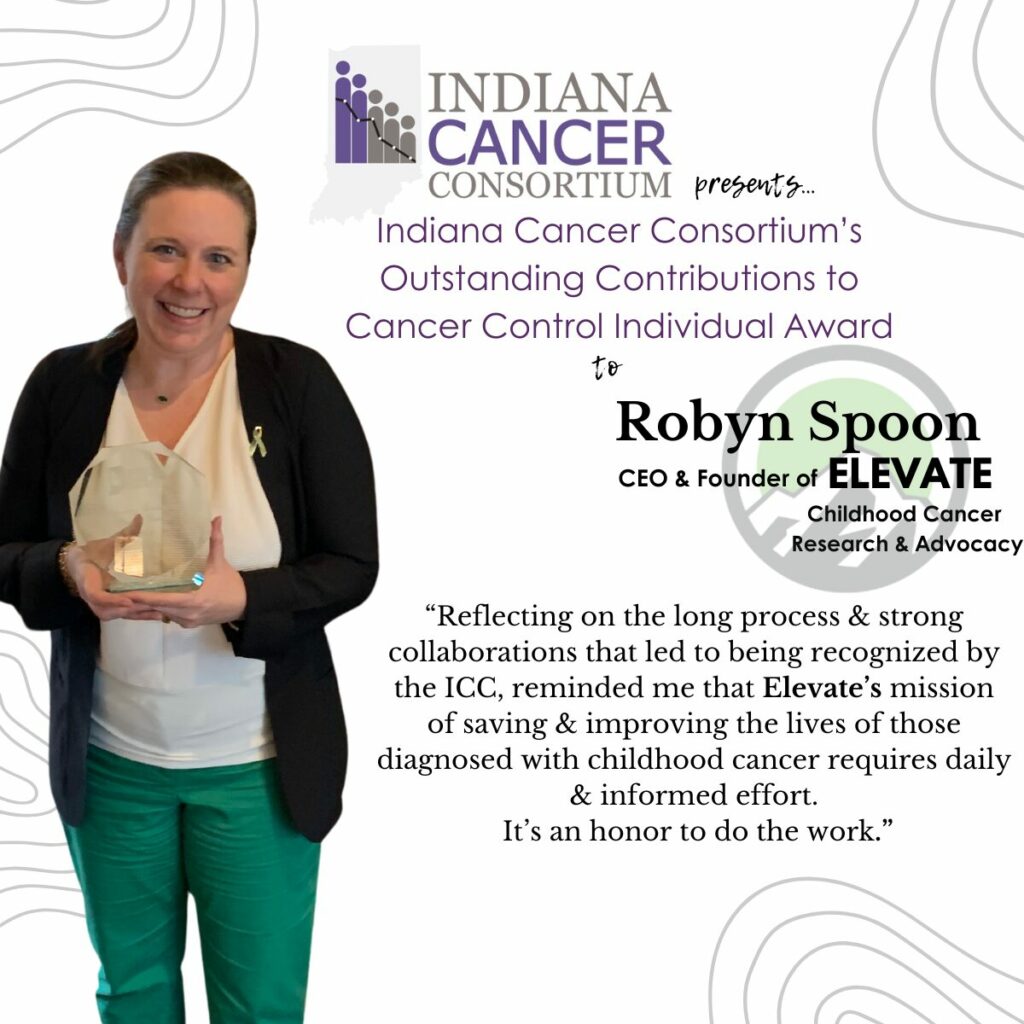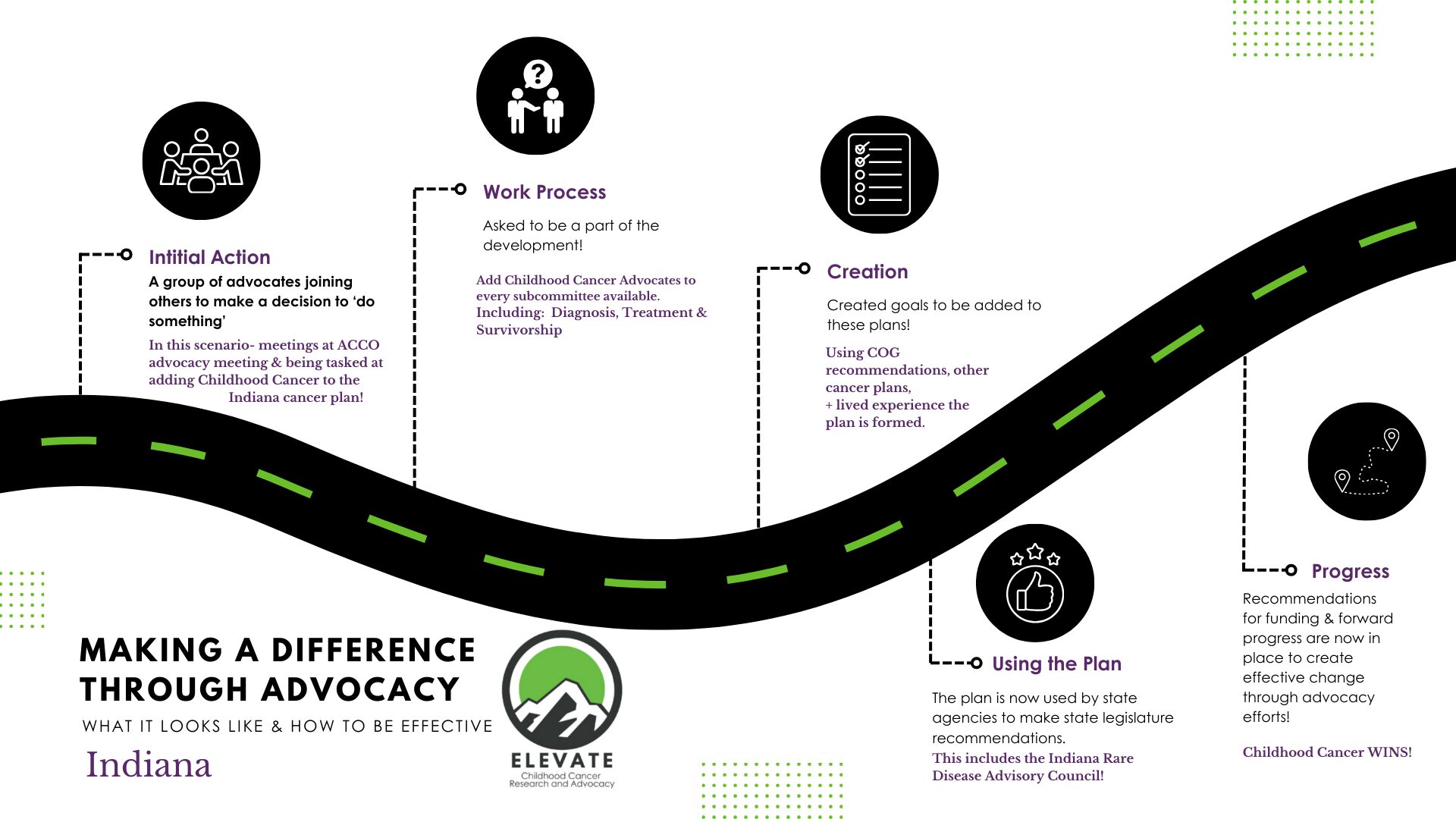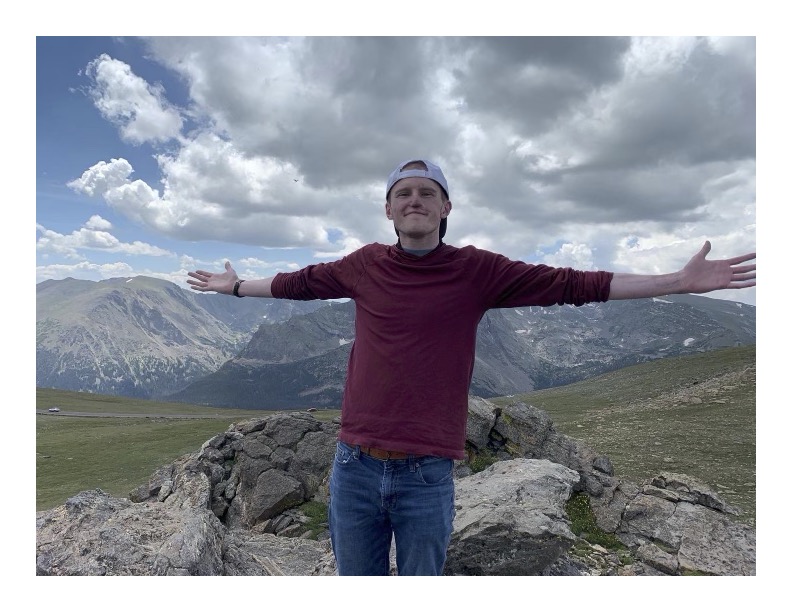
Reflecting on the long process and strong collaborations that led to being recognized by the ICC, reminded me that Elevate’s mission of saving and improving the lives of those diagnosed with childhood cancer requires daily and informed effort. It’s an honor to do the work.
_____________________________________________________
“You must feel like you are never getting anywhere.”
Yesterday, I was on a Zoom call with a mother of a child facing a relapse of sarcoma, and she said this to me.
I thought about it and realized I don’t feel that way at all. Quite the opposite. Every single day, I see how Elevate’s work is making incremental progress towards improvements in treatments and therapies for those diagnosed with childhood cancer. I know the work we are doing is helping those in the thick of it gain access to high quality answers so they can make important decisions during treatment.

I get how some could feel that nothing is changing and nothing is improving. The problem is really thousands of tiny problems. Which is why it is critical to have a roadmap with many available stops along the way to measure our progress.
But I also know that time matters and we must move quickly!
Sometimes the work Elevate does can feel abstract to the outsider looking in, but we have a clear vision of the required steps to go from where we stand today to a world of treatment options that are more effective and less toxic for our kids facing cancer. Elevate is committed to breaking down the barriers within and among stakeholders responsible for bringing about changes to treatments for children with cancer.

I was reminded of one such effort this week. I was awarded with the Indiana Cancer Consortium’s Outstanding Contributions to Cancer Control Individual Award. When the director for the cancer consortium reached out a month ago to let me know I was being honored with this award at the annual cancer control meeting in Indianapolis, they asked me to prepare some short remarks. To be honest, preparing my “talk” caused me to reflect on my experiences with the cancer consortium. There were many times along the way that I questioned the number of hours and the number of volunteers needed to bring about change, but change happens one step at a time.
In the summer of 2021, myself along with a small group of advocates in Indiana had been encouraged by ACCO to see if we could get children added to the Indiana Cancer Plan. It turns out that every state is required to have a cancer plan that sets goals and objectives for the diagnosis, treatment and survivorship from cancer,  with the goal of reducing cancer burden across the United States. When we started our work, the only mention of children in the ICP was a recommendation for an HPV vaccine and the use of sunscreen to prevent adult-onset cancers. I sought a position on the steering committee for the Indiana Cancer Plan and we quickly filled subcommittees with childhood cancer advocates to ensure that Indiana would have goals to reduce the cancer burden not only for adults, but for children, too. The subcommittees and the steering committee struggled to include children in the plan. We were told they represented too small a population and that children weren’t the focus on the plan. Over time, however, the members of these committees softened and began to understand that children have been disenfranchised from these sorts of processes for far too long. One of the primary struggles was determining how to measure the improvements when the state knew so little of the goals we were creating. The decision was made to request baseline information for many of these goals: you have to start somewhere! In May of 2023, we received the final copy of the cancer plan which included a whole host of goals and recommendations to make improvements in Indiana for childhood cancer, and now those goals are being examined by the Rare Disease Advisory Council as possible recommendations to the Indiana Legislature.
with the goal of reducing cancer burden across the United States. When we started our work, the only mention of children in the ICP was a recommendation for an HPV vaccine and the use of sunscreen to prevent adult-onset cancers. I sought a position on the steering committee for the Indiana Cancer Plan and we quickly filled subcommittees with childhood cancer advocates to ensure that Indiana would have goals to reduce the cancer burden not only for adults, but for children, too. The subcommittees and the steering committee struggled to include children in the plan. We were told they represented too small a population and that children weren’t the focus on the plan. Over time, however, the members of these committees softened and began to understand that children have been disenfranchised from these sorts of processes for far too long. One of the primary struggles was determining how to measure the improvements when the state knew so little of the goals we were creating. The decision was made to request baseline information for many of these goals: you have to start somewhere! In May of 2023, we received the final copy of the cancer plan which included a whole host of goals and recommendations to make improvements in Indiana for childhood cancer, and now those goals are being examined by the Rare Disease Advisory Council as possible recommendations to the Indiana Legislature.
We may not have cured childhood cancer at that moment, but these small changes add up to big differences when we tackle them one at a time, and in every state across the country.
I’ve continued this past year to serve on the Survivorship Subcommittee of the Cancer Consortium, where we are creating a baseline of understanding regarding the use of Survivorship Care Plans for those diagnosed with childhood cancer. Another advocate and myself were in a meeting a few months ago, and we were struck once again for the need to advocate. The subcommittee didn’t realize this was an issue impacting children, so the original plan did not include working with the pediatric hospitals in the state. It wasn’t intentional for the group to leave children out, but they just didn’t realize this is an issue that affects kids. In fact, kids who survive their cancer have about 4-5 more decades of “surviving” to do than their adult cancer patient counterparts, so this is a VERY important issue for kids. One of our Elevate workgroup moms is also serving on the early diagnosis committee, which has a focus on genetic markers included in the heel prick tests during the newborn screenings. Ensuring that savvy and dedicated advocates have the resources and support they need to make a difference in these committees makes a difference. 
Attending the Indiana Cancer Consortium Annual Meeting was hard for me. I didn’t realize until I arrived that I was the only childhood cancer advocate present–I won’t do that again. I honestly didn’t think it would matter until the speeches and educational parts of the day began. An oncologist for IU Med, Dr. Rohan Maniar, opened the day with a program intended to bring everyone up to speed on the current state of cancer treatment. He showed slide after slide of the history and evolution of cancer treatment, first with the “Era of Chemotherapy”, followed by the “Era of Precision Medicine” and now the “Era of Immunotherapy”. My heart broke when Dr. Maniar shared that he had only ever practiced oncology during the “era of precision medicine” for the type of cancer he treats.
__________________________________
While it is amazing news for those with common adult cancers, the statement couldn’t be further from the truth for our kiddos who are still living in the “Era of Chemotherapy.”
With only 11 new drugs developed for children with cancer in the last three decades, as compared with hundreds for adults, children have been left behind.
__________________________________

It hurt to think about what my son, Justin, had been through having faced 22 rounds of toxic chemotherapy during his care, and what other children are still facing. Precision medicine and immunotherapy is mostly reserved for last ditch efforts, is often used off-label for children, and most frequently hand-me-downs from adult medicine.
Allie Kast, Government Relations Director for the American Cancer Society, provided an important update on the legislation passed in Indiana which “requires state-regulated insurance plans including Medicaid to cover comprehensive biomarker testing when supported by medical and scientific evidence.” She shared a slide at the event that demonstrated the steps needed to get to the goal of insurance paying for a targeted therapy for their cancer. Most childhood cancers are still stuck at the bottom of the staircase.
But we see the staircase and we see the steps and Elevate is tackling them, one at a time.
__________________________________
We need your help.
Would you consider being a recurring donor to Elevate?
In order to make an appreciable difference in children receiving precision medicine, Elevate needs funds to strategically invest in those labs developing these biomarker tests and the capacity to educate and inform families of the various institutions where they can donate their children’s tumor samples and blood samples to more quickly bring these options into view. [Donate HERE]
Why do we need donations?
Developing these kinds of tests and treatments for children’s cancers are not lucrative ventures. As a result, most of these efforts are being developed through the support of organizations like ours. While I know that Elevate can do great things without having the funds to invest in those kinds of projects, we know we NEED the funds to invest in these kinds of projects.

Elevate is also in the process of developing state-level and federal-level legislative education councils intended to teach advocates the connections between the role of legislation and improvement for outcomes for kids with cancer so that savvy advocates can make changes across every state.

Every single day, I see how Elevate is fulfilling our goal as a builder of coalitions, a collaborator, and a leader in the efforts to bring about the needed changes for children facing a cancer diagnosis. We work hard every day to better understand the challenges facing those trying to develop new therapies, so that we can come alongside them and make the differences needed to bring hope to those diagnosed with childhood cancer in the future.

——————————
The Takeaway:
Childhood Cancer is 4-5 decades behind the most common adult cancers.
Every single day, Elevate is making incremental progress towards improvements in treatments & therapies for those diagnosed with childhood cancer.
Bringing precision medicine and immunotherapy to the forefront of childhood cancer is going to require a roadmap, which Elevate is building.

@2023 ELEVATE Childhood Cancer Research
and Advocacy, Inc.
is a registered 501(c)(3) non-profit organization.
EIN: 93-2185372
Join us! Stay up to date with our work and mission.
Please help keep our site secure and solve this problem.
We respect your privacy and will never sell or share your information.